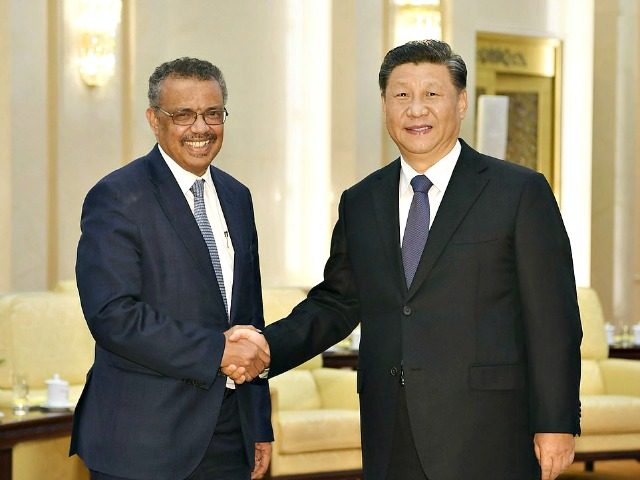The director-general of the World Health Organization (W.H.O.), Tedros Adhanom Ghebreyesus, will deliver a virtual 2020 commencement speech at China’s Tsinghua University School of Economics and Management (Tsinghua SEM) on June 21, the school announced this week.
Tsinghua, located in Beijing, is one of China’s most prestigious universities and the alma mater of dictator Xi Jinping, with whom Tedros enjoys a close relationship. Tedros, the first W.H.O. chief to hold the top post at the international public health agency without a medical degree, has faced months of criticism for vocally praising Xi’s response to the Chinese coronavirus pandemic and taking actions to placate China that experts say cost thousands of lives, like excluding the nation of Taiwan from pandemic response coordination.
Multiple reports have accused Xi of pressuring Tedros to hide the contagious nature of the coronavirus in January, months after China reportedly documented the first cases of infection by the new virus. The W.H.O. denied a report by Reuters claiming that Xi also pressured Tedros to delay declaring the global outbreak a pandemic, triggering pivotal public health protocols, during a conversation prior to the W.H.O. chief’s visit to Beijing in late January.
“Tsinghua University School of Economics and Management (Tsinghua SEM) will hold its Commencement 2020 on June 21. This year, Tsinghua SEM is honored to have Dr. Tedros Adhanom Ghebreyesus to deliver the Commencement Speech online,” the school announced, applauding Tedros for his public health record in Ethiopia and receiving the Jimmy and Rosalynn Carter Humanitarian Award in 2011.
Prior to joining the W.H.O., Tedros was a member of the Tigrayan People’s Liberation Front (TPLF), a violent Marxist party in his native country. He served as both health minister and foreign minister in Ethiopia, positions he leveraged to attract Chinese investment in the country by offering the Communist Party growing influence there. Located in eastern Africa, Ethiopia offers China proximity, and therefore influence, to some of the most contentious parts of the Middle East.
The outlet Taiwan News, which has documented how Tedros repeatedly ignored warnings from Taipei that a contagious respiratory illness was spreading in China during the early days of the outbreak, noted that Tsinghua University’s announcement was met with derision and skepticism in the free world. Among those criticizing the move was Sen. Rick Scott (R-FL), who asked wryly, “are we surprised?” and noted the speech highlighted “the cozy relationship between the W.H.O. and the Chinese Communist Party.”
Sen. Tom Cotton (R-AR), who has also vocally condemned China for its deliberately poor handling of the Chinese coronavirus pandemic, also weighed in.
Advance copy of text: How to cover up a pandemic https://t.co/j4wRWtv9Qp
— Tom Cotton (@SenTomCotton) June 15, 2020
Cotton has in the past asserted that he believes that Tedros received direct financial benefits from his relationship with China.
“Going back to Dr. Tedros’ time in Ethiopia, where China had one of its first Belt and Road initiatives, corruption, payoffs, bribes, and kickbacks follow fast on the heels of the Belt and Road initiative. And China aggressively campaigned in 2017 for Dr. Tedros to become the head of the W.H.O. You have to ask yourself, why would they do that?” Cotton said in April.
The Belt and Road Initiative (BRI) is an ambitious Chinese plan to rebuild global infrastructure, beginning with connective transport tissue between Beijing and Western Europe. BRI has resulted in millions of dollars in predatory loans issued to African countries, often at the expense of the communities where China claims to be building trains, ports, and other critical projects.
President Theodore Roosevelt approved the use of American funds to establish Tsinghua University in 1911, initially as a school to train students to later come to America to study. It has since evolved into one of the world’s most respected academic institutions, though it emerged from the terror of the Cultural Revolution a source of communist “unity,” engaging in Marxist indoctrination rather than genuine teaching. Xi Jinping graduated from Tsinghua with a degree in chemical engineering at the tail end of the Cultural Revolution, in 1979, and returned for a doctorate in Marxist “ideological education,” receiving his degree in 2002.
Under Xi, Tsinghua has attempted to raise its international profile as an academic hub, announcing in 2018 that it would broadcast its “Introduction to Mao Zedong Thought” classes online for anyone around the world to follow for free. More recently, in April, Xi facilitated the creation of the Tsinghua University Vanke School of Public Health. Tedros issued a statement congratulating China on opening a public health school during a pandemic studies show Beijing largely helped create.
Tsinghua appointed as dean of the new school Margaret Chan, Tedros’ predecessor at the W.H.O. Chan has been widely criticized for the W.H.O.’s failure to appropriately respond to the 2014-2016 west African Ebola outbreak, the deadliest in history, and for measures to legitimize “traditional Chinese medicine,” a spiritual practice that Beijing generates millions of dollars a year advertising as a scientific alternative to actual medicine.
While Tsinghua played a major role in Xi’s academic development, daughter Xi Mingzhe did not follow in his footsteps, graduating from Harvard University instead.
Tsinghua has also been the source of some of the most scathing criticism against Xi in the country. Tsinghua law professor Xu Zhangrun was suspended from teaching for a year and banned from leaving the country in February after publishing a detailed article condemning Xi’s bureaucratization of the Communist Party and warning that “the angry people will no longer be afraid” of challenging him.
“The political system has collapsed under the tyranny, and a governance system [made up] of bureaucrats, which has taken [the party] more than 30 years to build has floundered,” Xu wrote of Xi’s leadership. “The mess in Hubei [where the coronavirus outbreak originated] is only the tip of the iceberg and it’s the same with every province.

COMMENTS
Please let us know if you're having issues with commenting.